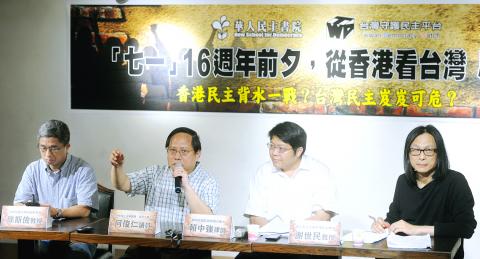|
Handle cross-strait
ties cautiously: HK official
POWER PLAY: A Hong Kong Legislative Council
member yesterday said Taiwanese must be ¡¥awake¡¦ when dealing with China, giving
examples of Beijing not keeping its word
By Loa Iok-sin / Staff reporter

From left to right, Academia
Sinica political scientist Hsu Szu-chien, Hong Kong Legislative Council member
Albert Ho, Cross-Strait Agreement Watch convener Lai Chung-chiang and National
Chung Cheng University philosophy professor Shei Ser-Min attend a symposium
yesterday held jointly by the New School for Democracy and Taiwan Democracy
Watch.
Photo: Liu Hsin-de, Taipei Times
Taiwan has to be cautious when enhancing
cross-strait ties, Hong Kong Legislative Council member Albert Ho (¦ó«T¤¯) said in
Taipei yesterday, basing his warning on Hong Kong¡¦s experience of being under
China¡¦s ¡§one country, two systems¡¨ policy since its return to Chinese rule in
1997.
¡§As a Chinese from Hong Kong, of course I would be happy to see the two sides of
the Strait enhancing relations, but I definitely would not want to see Taiwan
being conquered by mainland China with economic power before the democratization
of mainland China,¡¨ Ho said on the sidelines of a forum on cross-strait
relations from a Hong Kong perspective.
¡§There are many things about which we can¡¦t make our own decisions in Hong Kong.
Because we are not a sovereign country, we don¡¦t have the bargaining power.
However, it¡¦s different for Taiwan and I hope the people of Taiwan can use your
bargaining power well. It would be a pity if you just give it up,¡¨ he said.
At the forum, Ho, speaking to a Taiwanese audience ahead of the 16th anniversary
of Hong Kong¡¦s return to China on Monday, said that China has made promises to
maintain the democratic system in Hong Kong. However, Beijing is trying to
impose more restrictions on freedom and democracy in different ways, ¡§and we
still don¡¦t have direct suffrage for our chief executive.¡¨
Elaborating on China¡¦s economic control over Hong Kong, Ho said that while China
acts like it respects and follows the Hong Kong Basic Law, ¡§it extends its
influence by sponsoring non-governmental organizations and grassroots community
organizations in Hong Kong.¡¨
¡§China also mobilizes legislative council members, especially those who have
economic interests there, to legitimately pass policies that favor the mainland
and enhance Beijing¡¦s influence over Hong Kong,¡¨ Ho said.
Asked to comment on the cross-strait service trade agreement that Taiwan signed
with China on Friday last week, Ho said that Taiwan may face the same situation
as Hong Kong did when it signed the Closer Economic Partnership Arrangement
agreement with China.
¡§The agreement may look like Hong Kong and the mainland are mutually opening up
markets to each other, but in fact China opened up only the front door, but not
the many small doors behind it, while Hong Kong, an economically highly
liberalized city, has nothing behind the front door,¡¨ Ho said. ¡§Hence, capital
from China can flow freely into Hong Kong, but capital from Hong Kong runs into
many barriers after entering into the Chinese market.¡¨
Therefore, Ho said, Taiwanese should stay ¡§awake¡¨ when facing China¡¦s economic
pressure.
¡§Many people in Hong Kong would worry that if we put too much emphasis on the
values of freedom and democracy when dealing with China, it would hurt Hong Kong
economically,¡¨ he said. ¡§However, I would say that in the long run, an
authoritarian regime would hurt the economy the most.¡¨
|
![]()
![]()
![]()